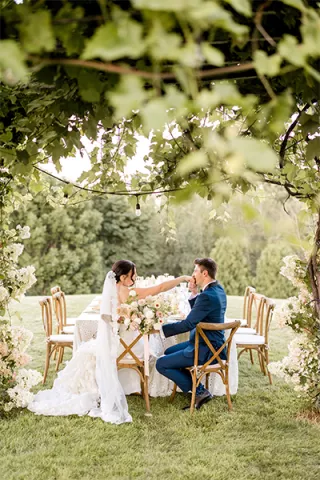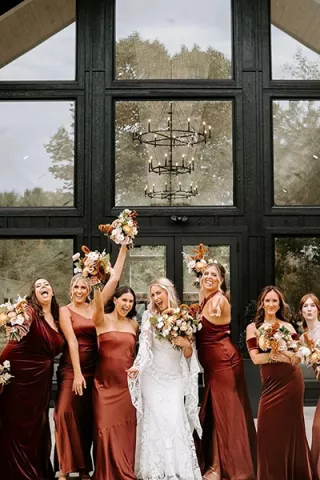When Anna Claussen and Mark Apfelbacher started planning their fall wedding, they looked for a venue that would reflect their personalities. “We both were inclined to have something that fit our passion for nature and the outdoors,” says Claussen, who grew up on a farm in south central Minnesota. Though Apfelbacher was not raised on a farm, he wanted their wedding to reflect his love of natural places, shaped by visits to his family’s cabin growing up. For both, the perfect place for their wedding was a friend’s farm.
You don’t have to grow up in the country (or know someone who did) to have a farm wedding. Jesseli Jacobson and her husband Luke chose Gale Woods Farm for their wedding last September in part because Jacobson works in the greenhouse industry. “It’s part of our lifestyle, so we wanted to incorporate it into our wedding as an expression of who we are,” says Jacobson. Couples passionate about local or sustainable food, farmers’ markets, or the outdoors might want to exchange vows in a pasture as sheep graze in the distance, followed by dinner and dancing in a rustic red barn.
Farms in and near the Twin Cities offer a variety of ceremony and reception options. Formerly a dairy farm, Round Barn Farm in Red Wing is now a five-room bed and breakfast with landscaped gardens. It can host up to 150 people in its eponymous circular barn. Some working farms can also host weddings. Gale Woods Farm on Whaletail Lake in Minnetrista is a 410-acre park reserve that raises animals and grows vegetables.
Worried that odor-conscious guests might balk at some of the earthier animal smells? Don’t be. “It didn’t affect the wedding at all,” says Jacobson. “For me, it was a plus. The sheep out in the pasture add to the ambiance.”
Hay bales or high heels?
When you plan a wedding at a farm, “you have to embrace what you have,” says Sarah Trotter of Lasting Impressions Weddings & Events, who worked with Claussen and Apfelbacher. “You don’t have to use hay bales or completely go that rustic route,” she says, but couples may choose to incorporate farm-themed décor items such as pumpkins or flowers from the farmers’ market. Bride Jessica Bachaus designed centerpieces featuring Ball jars for her wedding at Round Barn Farm, because they felt “country” and reminded her of her mother making jam when Bachaus was a child.
And don’t break out the overalls and gingham dresses just yet (unless you want to, of course). Despite the rustic vibe, many brides choose to wear formal wedding gowns. However, leave the stilettos at home, and opt for a shoe with a thicker heel or wedge that won’t sink into the aisle of a meadow ceremony. Some brides may opt for flat shoes, especially if the ground is particularly soft.
From farm to table
If you’re passionate about local or sustainable food, a farm wedding can express your dedication to your guests in a tangible way. Claussen and Apfelbacher married in the fall because of the range of in-season fruits, vegetables and meats available, and 80 percent of their food was sourced within 200 miles. Jesseli and Luke Jacobson used a recommended caterer for a pig roast, and Bachaus and her husband Zach
substituted wedding pie for the traditional wedding cake.
Farms also allow couples to offer activities not often available at a more traditional venue. At Gale Woods, guests can play horseshoes or volleyball, explore nature trails, or congregate around a bonfire and make s’mores at night. Almost a third of the guests attending Claussen and Apfelbacher’s wedding camped in tents for the weekend, as did the bride and groom.
Comforts of home
Although you may be attracted to a farm for its natural appeal, you’ll still want to make sure your guests are comfortable. Claussen and Apfelbacher set up a website to introduce their guests to the farm, so they weren’t “going in blind,” and had an idea of what to expect at the non-traditional wedding.
And even those who know what to pack for a day at the lake may not think to bring those essentials to a wedding. Couples should consider providing bug spray, sunscreen or flashlights for guests who might not remember to bring their own.
Comfort doesn’t have to start and end with the ceremony and reception. Although some farms are in the Metro area, many are in more rural areas that may be unfamiliar to your guests. A shuttle between the hotel where your guests are staying and the farm allows your guests to celebrate and not worry about driving unfamiliar (and often dark) roads. If the ceremony site is a long walk from the reception or shuttle drop-off point, consider renting golf carts or other motorized transport to ensure your venue is accessible to all guests.
Pros and cons
A farm might seem like a no-frills location, but all told, the wedding might not be cheaper than a banquet hall. “Any time you’re going to do something unique like this, it’s going to cost you quite a bit more,” says Trotter, who recommends that couples planning a farm wedding be aware of the costs of a non-traditional venue and build those costs into the budget. “You’re renting everything—chairs and tables, linens; everything these hotel ballrooms and reception sites already have.”
But while couples may have to dedicate a larger portion of their budget to rentals, they often save in other ways. “When you pick a gorgeous location, you don’t have to do a lot to make it fancy,” says Bachaus, who chose to marry in the fall for the changing leaves. “Our pictures are just stunning.”
For some couples, the concern may not be price, but rather the time involved in coordinating an event at a farm. “It was a little bit more work on our part to make sure everything happened when it was supposed to happen, because we were the project managers,” Bachaus says.
Hiring a wedding planner may be especially helpful for farm weddings. “There are so many more unforeseen circumstances just because it’s usually only been done a few times,” says Trotter. “You need that one person to meld all of those elements together—to make sure the bathrooms get there, to make sure the caterers have water, or that the area has been sprayed for bugs.”
Water may be great for the plants on the farm, but it’ll dampen your ceremony if you don’t have an alternate location. “We originally had everything planned outside, and it turned out to be a rainy weekend,” says Trotter about Claussen and Apfelbacher’s wedding. A barn could also house a ceremony, or a couple could opt for a tent to provide shade as well as shelter.
A journey
“We wanted the planning process to be a journey, and the wedding was a capstone on that,” says Claussen. To get to know the farm, couples can volunteer to help out with chores, join the CSA at Gale Woods Farm, or hike the area’s nature trails before the big day. “Making it fun was important to us,” says Apfelbacher. You may be getting married at a farm, but planning needn’t be a chore.













